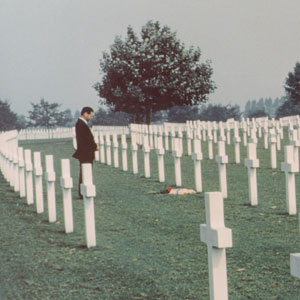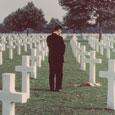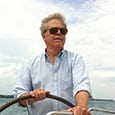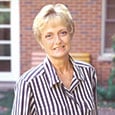 Today the world knows him as Colonel Arnald D. Gabriel, Conductor Emeritus of the United States Air Force Band and the Singing Sergeants. During WWII, however, he was a machine gunner in the U.S. Army.
Today the world knows him as Colonel Arnald D. Gabriel, Conductor Emeritus of the United States Air Force Band and the Singing Sergeants. During WWII, however, he was a machine gunner in the U.S. Army.
Private Gabriel was assigned to a three-man machine gun crew and took part in the D-Day invasion at Normandy, France on June 6, 1944. Johnny Arrowsmith from Connecticut and Harry Aschoff from New Jersey joined his machine gun squad in September 1944 as replacements in Germany. On January 9, 1945 an enemy mortar shell tragically ended the lives of Aschoff and Arrowsmith.
.jpg) Gabriel fought on to victory and later attended the Ithaca College School of Music. In May 1951 he drove to Washington, D.C. with a college buddy and auditioned for bandleader positions with the U.S. Air Force Band. Both were accepted.
Gabriel fought on to victory and later attended the Ithaca College School of Music. In May 1951 he drove to Washington, D.C. with a college buddy and auditioned for bandleader positions with the U.S. Air Force Band. Both were accepted.
From 1951-1964 Gabriel led the bands at several air bases in the U.S. and Germany and directed the Air Force Academy band in Colorado. In 1964 Air Force Chief of Staff General Curtis E. LeMay interviewed Captain Gabriel to become the third conductor of the U.S.A.F. Band. LeMay chose him over other Air Force band officers of higher rank. For the interview Gabriel wore his Class A uniform with all of his ribbons, which included two Bronze stars, the French Croix de Guerre, and the Combat Infantryman’s Badge.
After accepting the position, Gabriel turned to leave as LeMay commented, “You know Captain, the Air Force discourages wearing Army insignias.” Gabriel replied, “Yes sir, I know that.” The paths of these two officers crossed many times in later years, but that was the only time LeMay ever mentioned this, and Gabriel never removed his badge of honor. Even today when Gabriel wears his formal Air Force uniform, the Combat Infantryman’s badge is in the place of honor above his medals.
In a ceremony on January 9, 2008, the Air Force named its rehearsal and recording studio the Arnald D. Gabriel Hall, exactly 63 years after that mortar killed his comrades. Six months later Gabriel received this e-mail from Nancy Aschoff-Pardo.
"I am the granddaughter of Harry E. Aschoff, Sr. who served in WWII with the 175th. He was a machine gunner, and I believe you may have served alongside him. For years my sister and I have been desperately trying to help our dad find any information about his father and came across your name. Because our father was only two years old when our grandfather was killed, he has no memories of his father. If you could give me any information or have any pictures of Harry Aschoff, I would love to hear from you. " – Nancy Aschoff-Pardo
Sixty-three years after the grandfather they never knew died in combat, his granddaughters found Arnald D. Gabriel, who immediately replied.
Dear Nancy,
How wonderful to hear from you! I indeed knew your grandfather. I was in the same machine gun section in I Company of the 175th Regiment as your grandfather. He and Johnny Arrowsmith were killed on January 9, 1945 near Bourheim, Germany. Your grandfather is buried in Margraten Cemetery, Holland. I am enclosing a photo of his grave, on which I have laid flowers.
Nancy responded:
You have brought tears to my eyes. I can’t believe we have found you after all these years of searching for someone who fought with him during the war.
In the ensuing months Gabriel met the son and granddaughters of his fallen comrade and learned that his widow had remarried. Her new husband had tried to destroy all memory of Harry Sr. by tearing up photos and military records; he even threw away his medals. Harry Jr. had no memory of his father.
Gabriel invited Harry Aschoff, Jr. and his wife to come to Washington, D.C. for a two-day visit. After Gabriel gave them a tour of the WWII Memorial, Harry Jr. stopped a National Park Service employee to ask if there was any reason for the order of the placement of the state pillars. Harry and Gabriel stopped and stared at the New Jersey and Connecticut pillars sitting side by side. (Harry Aschoff, Sr. was from New Jersey, Johnny Arrowsmith from Connecticut.)
Gabriel describes other events from the visit:
My son Mike and his wife, Trish, attended the Tuesday concert with Harry and his wife at the Jefferson Memorial. We went to dinner following the concert. Mike and his wife are pilots with American Airlines and have just been upgraded to the 767s. Harry’s wife is a pilot with Spirit Airlines, and Harry is a mechanic at Newark and works on 767s. Mike used to fly into Newark. Needless to say, there was no lull in the dinner conversation.
At the Wednesday night concert at the Air Force Memorial, Col. Layendecker attended and told the entire story to the audience after “No Finer Calling” and “America the Beautiful,” which he dedicated to Harry. These pieces were programmed before I knew Harry was coming to Washington. At the end of the visit, as Harry was about to leave he gave me a hug and asked, “Will you be my Dad?” My answer was obviously a tacit “yes.”
Amidst tears and hugs I became Harry Jr.’s new father. In correspondence with both him and Nancy, I am referred to as Colonel Dad.
Arnald Gabriel believes “The Band of Brothers is a reality with Infantry-men. We never forget.” To this day whenever Gabriel is in Europe, he always visits the graves of his two fallen comrades in arms at the American Military Cemetery in Margraten, The Netherlands.





